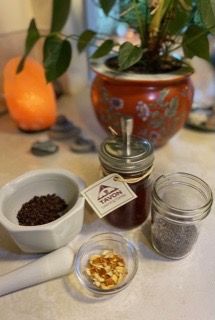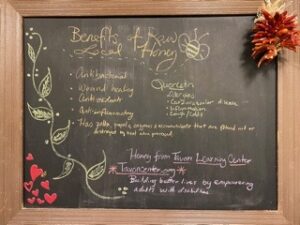Make Your Own Herb-Infused Raw Local Honey for Allergy Season

There are so many healthy properties to raw honey. It contains bee pollen and propolis, enzymes, and other micronutrients (including B-vits, calcium, magnesium, zinc to name just a few) that are usually destroyed or filtered out when processed.
Honey is naturally:
- Antibacterial
- Good for wound healing.
- Antioxidant
- Anti-inflammatory
- Can help relieve diarrhea.
- Can protect brain health.

Honey also contains quercetin which can reduce cardiovascular disease, help with inflammation, soothe 1 a scratchy throat, calm a cough, and ease symptoms of a cold. What quercetin is also great with is allergies. This is where it is important to choose raw, LOCAL honey (from roughly 50 mi radius from you) as it has the pollens that are most likely to cause seasonal allergy sufferers their symptoms.
Beginning in winter, if you start to consume roughly a teaspoon of honey daily, it may help to reduce the build-up of histamine, helping to reduce symptoms from common allergens by the time spring rolls around. This is similar in action to an allergy shot. 2
I really love all the benefits that honey has to offer and I like to add to those benefits by making my own herbal-infused honey. You can take any herbs that you like. In this video, I use elderberries and lavender from my garden and dried orange peel. Elderberry we all know to be a great immune system booster with vitamins and antioxidants. Lavender is good for stress and insomnia, and the orange peel adds a kick of vitamin C with other vitamins.
For the honey part, I love the raw, honey from Tavon Learning Center in Issaquah, WA. They are an organization that provides learning and community opportunities that empower adults with disabilities. They also have a fantastic organic garden on their property. tavonlearningcenter.org
All you need is a clean jar with a lid, herbs of your choice, and honey. Fill your jar about 1/2 full of dry or fresh herbs, pour in honey, stir then seal. Shake your love and good intentions into it and place it on a shelf or in a warm sunny spot for a minimum of 2 weeks – being sure to flip your jar daily.
When you are ready to press, gently warm your honey in a water bath (do not boil) and pour into a mesh strainer over a clean container. Use a spoon to press out as much honey as you can. The herbs leftover are called the “mark” and you can compost or save in your fridge and add a pinch to sweeten a cup of tea. It will last a very long time in the fridge.
Enjoy your yummy honey!
Dr. Zimmerman
*PS Honey is not for infants under 1 year old.*
————–

